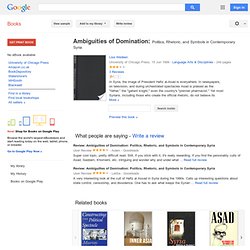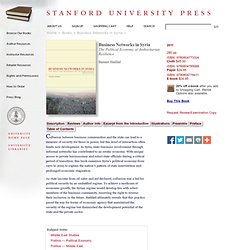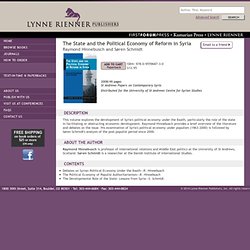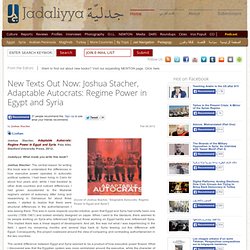

Changing Regime Discourse and Reform in Syria. Syria Under Bashar Al-Asad: Modernisation and the Limits of Change - Volker Perthes. Ambiguities of Domination: Politics, Rhetoric, and Symbols in Contemporary Syria - Lisa Wedeen. In Syria, the image of President Hafiz al-Asad is everywhere.

In newspapers, on television, and during orchestrated spectacles Asad is praised as the "father," the "gallant knight," even the country's "premier pharmacist. " Yet most Syrians, including those who create the official rhetoric, do not believe its claims. Why would a regime spend scarce resources on a cult whose content is patently spurious? Wedeen concludes that Asad's cult acts as a disciplinary device, generating a politics of public dissimulation in which citizens act as if they revered their leader. By inundating daily life with tired symbolism, the regime exercises a subtle, yet effective form of power. Contemporary Syria: Liberalization Between Cold War and Cold Peace - Eberhard Kienle. Business Networks in Syria: The Political Economy of Authoritarian Resilience - Bassam Haddad. "Based on his extraordinarily deep knowledge of Syrian society and business practices, Haddad describes at length how these informal networks molded economic institutions to preserve their own interests. . .

A significant, timely analysis. Summing Up: Highly recommended. "—P. Clawson, CHOICE "Bassam Haddad has produced a path-breaking study of Syria's political economy. "A courageous and sophisticated account of the role of Syria's crony capitalist networks in the process of partial privatization after 1986. Collusion between business communities and the state can lead to a measure of security for those in power, but this kind of interaction often limits new development. As state income from oil sales and aid declined, collusion was a bid for political security by an embattled regime.
Bassam Haddad is Director of the Middle East Studies Program and teaches in the Department of Public and International Affairs at George Mason University, and is Visiting Professor at Georgetown University. Power and Policy in Syria. Asad : Patrick Seale. The State and the Political Economy of Reform in Syria. Raymond Hinnebusch and Søren Schmidt This volume explores the development of Syria's political economy under the Baath, particularly the role of the state in facilitating or obstructing economic development.

Raymond Hinnebusch provides a brief overview of the literature and debates on the issue. His examination of Syria's political economy under populism (1963-2000) is followed by Søren Schmidt's analysis of the post-populist period since 2000. Raymond Hinnebusch is professor of international relations and Middle East politics at the University of St Andrews, Scotland. Søren Schmidt is a researcher at the Danish Institute of International Studies. Debates on Syrian Political Economy Under the Baath—R. Demystifying Syria by Lawson, Fred H.
Joshua Landis - Syria Reading list. New Texts Out Now: Joshua Stacher, Adaptable Autocrats: Regime Power in Egypt and Syria. Joshua Stacher, Adaptable Autocrats: Regime Power in Egypt and Syria.

Palo Alto: Stanford University Press, 2012. Jadaliyya: What made you write this book? Joshua Stacher: The central reason for writing this book was to understand the differences in how executive power operates in autocratic political systems. I had been living in Cairo for about four years and, while I had traveled to other Arab countries and noticed differences, I had grown accustomed to the Mubarak regime's variant of autocracy. After living and researching in Damascus for about three weeks, I started to realize that there were structural differences in the authoritarianism I was seeing there. The central difference between Egypt and Syria seemed to be a product of how executive power flowed. J: What particular topics, issues, and literatures does it address? JS: The central literature my book addresses is on authoritarian durability.
This book also addresses topics such as authoritarian change. The Struggle for Power in Syria.